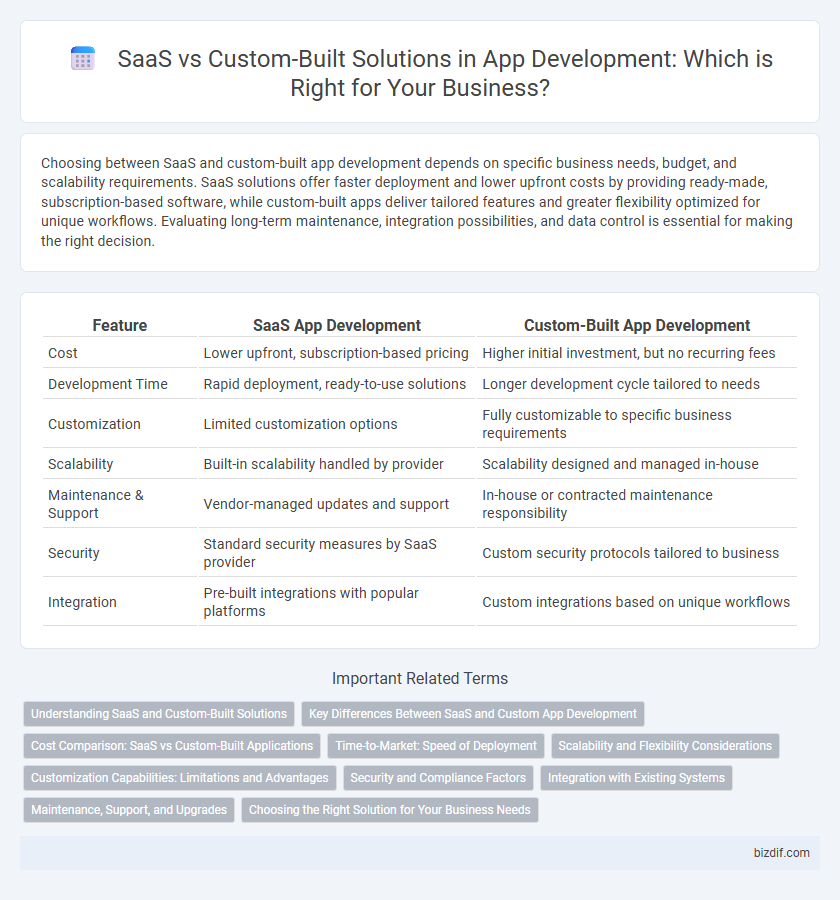Choosing between SaaS and custom-built app development depends on specific business needs, budget, and scalability requirements. SaaS solutions offer faster deployment and lower upfront costs by providing ready-made, subscription-based software, while custom-built apps deliver tailored features and greater flexibility optimized for unique workflows. Evaluating long-term maintenance, integration possibilities, and data control is essential for making the right decision.
Table of Comparison
| Feature | SaaS App Development | Custom-Built App Development |
|---|---|---|
| Cost | Lower upfront, subscription-based pricing | Higher initial investment, but no recurring fees |
| Development Time | Rapid deployment, ready-to-use solutions | Longer development cycle tailored to needs |
| Customization | Limited customization options | Fully customizable to specific business requirements |
| Scalability | Built-in scalability handled by provider | Scalability designed and managed in-house |
| Maintenance & Support | Vendor-managed updates and support | In-house or contracted maintenance responsibility |
| Security | Standard security measures by SaaS provider | Custom security protocols tailored to business |
| Integration | Pre-built integrations with popular platforms | Custom integrations based on unique workflows |
Understanding SaaS and Custom-Built Solutions
SaaS solutions offer scalable, subscription-based access to standardized software hosted on the cloud, enabling rapid deployment and lower upfront costs suited for businesses seeking flexibility. Custom-built applications provide tailored functionality designed specifically to meet unique business requirements, offering greater control but often involving higher development time and investment. Choosing between SaaS and custom-built depends on factors such as budget, scalability needs, integration complexity, and long-term strategic goals.
Key Differences Between SaaS and Custom App Development
SaaS app development offers subscription-based, ready-made solutions that prioritize rapid deployment and scalability, while custom app development delivers tailored software specifically designed to meet unique business requirements and workflows. SaaS platforms provide regular updates and reduced maintenance overhead, whereas custom apps require dedicated development resources for ongoing customization and integration. Cost structures differ significantly, with SaaS typically involving predictable monthly fees and custom development demanding higher upfront investment but greater flexibility and ownership.
Cost Comparison: SaaS vs Custom-Built Applications
SaaS applications typically offer lower upfront costs due to subscription-based pricing and minimal infrastructure requirements, making them cost-effective for small to medium-sized businesses. Custom-built applications involve higher initial investments for development, design, and testing, but can reduce long-term expenses by tailoring features to specific business needs and avoiding recurring subscription fees. Organizations must weigh immediate cost savings of SaaS against the potential for customized efficiency and scalability in custom-built solutions.
Time-to-Market: Speed of Deployment
SaaS solutions offer significantly faster time-to-market due to pre-built features and ready-made infrastructure, enabling companies to deploy applications within days or weeks. Custom-built applications require extensive development cycles, often taking months to design, develop, and test tailored functionalities. Choosing SaaS accelerates speed of deployment while custom development prioritizes bespoke solutions but with longer lead times.
Scalability and Flexibility Considerations
Custom-built applications offer superior scalability tailored to specific business growth trajectories, accommodating unique workflows and complex integrations. SaaS solutions provide flexibility with rapid deployment and regular updates but may present limitations in customization and scaling beyond predefined tiers. Evaluating long-term scalability demands alongside flexibility requirements is critical for selecting between SaaS and custom-built app development.
Customization Capabilities: Limitations and Advantages
Custom-built app development offers unparalleled customization capabilities, allowing businesses to tailor features and user experiences to precise specifications. Unlike SaaS solutions, which are constrained by predefined templates and limited flexibility, custom apps enable seamless integration with existing systems and scalability based on unique operational needs. However, this level of customization demands higher initial investment and longer development timelines compared to off-the-shelf SaaS platforms.
Security and Compliance Factors
SaaS applications typically offer built-in security features and compliance certifications such as SOC 2, GDPR, and HIPAA, ensuring regular updates and centralized management to mitigate risks. Custom-built solutions provide greater control over data security protocols and compliance customization, allowing organizations to tailor defenses to specific regulatory requirements. Evaluating whether to choose SaaS or custom-built should consider the sensitivity of data, industry regulations, and the organization's capacity to maintain continuous security monitoring and compliance audits.
Integration with Existing Systems
SaaS applications offer seamless integration with popular platforms through standardized APIs, enabling quick deployment and easy data synchronization across existing systems. Custom-built solutions provide tailored integration capabilities, allowing for deep customization to match unique workflows and legacy software requirements. Evaluating the complexity and scalability of your current infrastructure determines the optimal integration approach between SaaS and custom-built options.
Maintenance, Support, and Upgrades
SaaS platforms offer automated maintenance, continuous support, and regular upgrades managed by the provider, minimizing downtime and eliminating the need for in-house technical teams. Custom-built applications require dedicated resources for ongoing maintenance, personalized support, and tailored upgrade schedules, increasing long-term operational costs but allowing full control over feature implementation. Choosing between SaaS and custom solutions depends on balancing cost-efficiency with the need for customization and direct oversight of maintenance and upgrades.
Choosing the Right Solution for Your Business Needs
SaaS solutions offer scalable, cost-effective app development with faster deployment and regular updates, making them ideal for businesses seeking quick market entry and reliable maintenance. Custom-built apps provide tailored functionality and flexibility, ensuring unique workflows and specific business requirements are met with precision. Evaluating factors like budget, timeline, scalability, and long-term goals helps determine whether a standardized SaaS platform or a bespoke application aligns best with your business needs.
SaaS vs Custom-built Infographic

 bizdif.com
bizdif.com